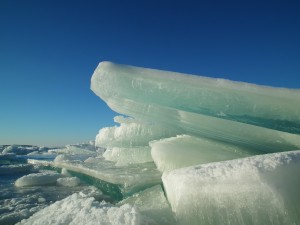Arctic water source
The Arctic water source has been identified as the region in the Northern Hemisphere that is most susceptible to the effects of climate variability and change, and is expected to display a warming that is more than twice the global average, show decreases in snow cover and sea-ice extent, display further retreat of permafrost, glaciers and ice-caps, and have increased inter-annual variability in weather conditions.

Changes in the Climate
Such significant changes/shifts in climatic regimes are expected to have far reaching first- and second-order impacts on the hydrology and ecology of northern/Arctic freshwater systems by impacting the ability of rivers, lakes and wetlands to maintain adequate stream flows, water levels and water quality for ecosystem sustainability.
Changing climate is expected to directly impact not only the magnitude and timing of freshwater fluxes, but also a range of physical, chemical and biological processes in northern aquatic ecosystems.
Predicting the future of the Arctic water source
It is difficult to project the effects changing climate and environmental factors will have on Arctic freshwater systems, partly due to a poor understanding of their interrelationships, and partly due to a paucity of long-term monitoring sites and integrated hydro-ecological research programs in the Arctic.
Arctic Freshwater Systems
In light of the need for better understanding of Arctic freshwater hydrology and ecology, through integrated multidisciplinary hydrological, climatologically, and ecological field studies and laboratory analyses, “Arctic Freshwater Systems: Hydrology and Ecology” (Co-Principal Investigators: Fred Wrona and Al Pietroniro) has the research priorities to: (i) improve our process-level understanding of Changing climate is expected to directly impact not only the magnitude and timing of freshwater fluxes, but also a range of physical, biological and chemical processes in northern aquatic ecosystems.
Environmental factors
It is difficult to project the effects changing climate and environmental factors will have on Arctic freshwater systems, partly due to a poor understanding of their interrelationships, and partly due to a paucity of long-term monitoring sites and integrated hydro-ecological research programs in the Arctic.
In light of the need for better understanding of Arctic freshwater hydrology and ecology, through integrated multidisciplinary hydrological, climatologically, and ecological field studies and laboratory analyses, “Arctic Freshwater Systems: Hydrology and Ecology” (Co-Principal Investigators: Fred Wrona and Al Pietroniro) has the research priorities to: (i) improve our process-level understanding of freshwater and nutrients flow, (ii) develop improved predictive models for freshwater and nutrient flux, (iii) develop a unique legacy database of freshwater biodiversity (structure and function) and related environmental information on freshwater ecosystems (lotic and lentic) in the Canadian Arctic, and (iv) develop and provide tools and capacity in northern communities for improved community-based monitoring and assessment of the status and trends of the health and integrity of freshwater ecosystems in northern Canada.
For more interesting article reading on the Arctic fresh water topic visit http://arcticfinland.net
